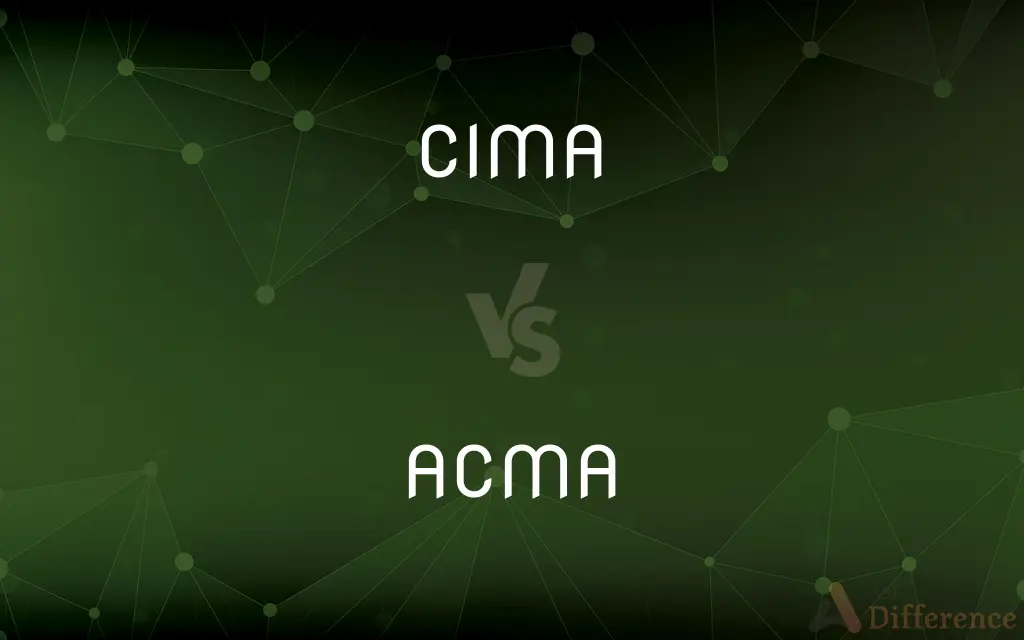CIMA vs. ACMA — What's the Difference?
By Tayyaba Rehman — Published on January 20, 2024
CIMA stands for the Chartered Institute of Management Accountants, a professional body for management accountants, while ACMA refers to an Associate Chartered Management Accountant, a designation awarded by CIMA.

Difference Between CIMA and ACMA
Table of Contents
ADVERTISEMENT
Key Differences
CIMA (Chartered Institute of Management Accountants) is a leading international professional body for management accountants. It offers training and qualification in management accounting. ACMA (Associate Chartered Management Accountant) is a professional designation given by CIMA to individuals who have successfully completed their qualifications and gained relevant work experience.
CIMA focuses on business finance and management accounting, providing education and professional development to its members. ACMA is a certification level within CIMA, signifying a professional's competence and experience in management accounting.
To become a member of CIMA, individuals must pass rigorous exams and fulfill certain educational and professional criteria. In contrast, to earn the ACMA designation, a member of CIMA must complete the CIMA Professional Qualification, gain relevant work experience, and adhere to a code of ethics.
CIMA is recognized globally and offers various resources like training, continuing professional development (CPD), and networking opportunities to its members. ACMA, as a designation, demonstrates a level of expertise and commitment to the field of management accounting.
CIMA provides a pathway to higher qualifications, like Chartered Global Management Accountant (CGMA) and Fellow Chartered Management Accountant (FCMA). ACMA is a stepping stone in this journey, representing an important professional milestone.
ADVERTISEMENT
Comparison Chart
Definition
Professional body for management accountants
Professional designation awarded by CIMA
Role
Provides education, qualification, and resources
Signifies individual's qualification and experience
Requirements
Passing exams, meeting educational criteria
Completing CIMA qualification, work experience
Recognition
Internationally recognized body
Recognized designation within the accounting field
Progression
Offers pathway to higher qualifications
A level of qualification within CIMA
Compare with Definitions
CIMA
Focuses on business finance and management accounting.
CIMA's curriculum is tailored to the needs of business finance professionals.
ACMA
Professional designation by CIMA.
After years of hard work, I earned my ACMA designation.
CIMA
International body for management accounting.
I am studying for my CIMA exams to become a management accountant.
ACMA
Represents commitment to the accounting profession.
My ACMA designation shows my dedication to my career in accounting.
CIMA
Sets ethical and professional standards.
As a CIMA member, I adhere to high ethical standards in my work.
ACMA
A stepping stone to higher qualifications.
As an ACMA, I'm now aiming for the FCMA designation.
CIMA
Provides networking and training opportunities.
Attending CIMA events has expanded my professional network.
ACMA
Requires completing CIMA qualification and experience.
I achieved my ACMA status after gaining the necessary work experience.
CIMA
Offers qualifications and professional development.
CIMA provides excellent resources for my career development.
ACMA
Signifies expertise in management accounting.
Holding an ACMA title demonstrates my proficiency in management accounting.
Common Curiosities
What is the significance of the ACMA designation?
The ACMA designation signifies professional competence and experience in management accounting.
Does CIMA offer online courses?
Yes, CIMA offers various online courses and resources for its qualifications.
How do I become a CIMA member?
To become a CIMA member, you need to pass CIMA exams and meet certain educational and professional requirements.
How long does it take to achieve ACMA status?
The time to achieve ACMA status varies, depending on the pace of completing CIMA exams and acquiring relevant work experience.
What types of exams does CIMA offer?
CIMA offers exams in management accounting, business finance, and related subjects.
Are there different levels of membership in CIMA?
Yes, CIMA offers different levels of membership, including ACMA and FCMA.
What is CIMA?
CIMA is a leading professional body for management accountants, offering qualifications and resources.
What does ACMA stand for?
ACMA stands for Associate Chartered Management Accountant, a designation by CIMA.
Is CIMA recognized internationally?
Yes, CIMA is internationally recognized and respected in the field of management accounting.
Can anyone with accounting experience become an ACMA?
Only those who have completed the CIMA qualification and gained relevant experience can become ACMA.
What are the benefits of CIMA membership?
CIMA membership offers access to educational resources, professional development, and a global network.
Is the ACMA designation permanent?
The ACMA designation is maintained through continuous professional development and adherence to CIMA's ethical standards.
Can I use the ACMA title globally?
Yes, the ACMA title is recognized globally in the field of management accounting.
Can ACMA holders practice in all areas of accounting?
ACMA holders are specialized in management accounting, though their skills can be applicable in various accounting areas.
Does having an ACMA affect salary potential?
Typically, holding an ACMA designation can positively impact salary potential due to the recognized expertise.
Share Your Discovery

Previous Comparison
Claritin vs. Claritin-D
Next Comparison
Hufflepuff vs. RavenclawAuthor Spotlight
Written by
Tayyaba RehmanTayyaba Rehman is a distinguished writer, currently serving as a primary contributor to askdifference.com. As a researcher in semantics and etymology, Tayyaba's passion for the complexity of languages and their distinctions has found a perfect home on the platform. Tayyaba delves into the intricacies of language, distinguishing between commonly confused words and phrases, thereby providing clarity for readers worldwide.












































